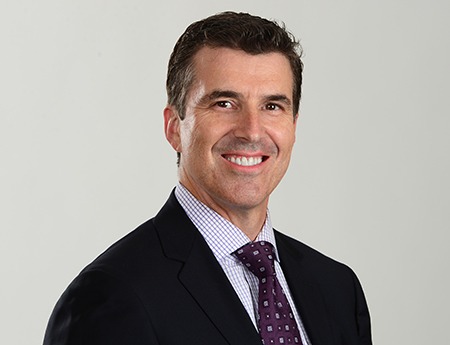Chaos in This Anchor’s Ear Rarely Winds Up on the Air

The smarter way to stay on top of broadcasting and cable industry. Sign up below
You are now subscribed
Your newsletter sign-up was successful
Rece Davis grew up in Guin (GYOO-in), a town of 2,000 people in northwestern Alabama, surrounded by football. The first three football seasons he remembers as a kid, the local high school won back-to-back-to-back state titles. It was like something out of a Friday Night Lights episode, he says. Football “was part of the culture. I fell in love with that.”
Fascinated by the sport and the people who called the games, Davis would spend his Saturday nights spinning the radio dial, listening to every college football game he could find. At the time, he thought he would end up as a broadcaster, but only after “a long and distinguished career” playing football; alas, “my talent ran out after high school,” he says.
Now 50, Davis has already had a long and distinguished career in sports broadcasting. A 20-year ESPN veteran, Davis has been serving as a play-by-play announcer for college grid and basketball games and hosting pre-and postgame shows for the last decade. This past Saturday, he started his newest gig: host of ESPN’s College GameDay football pregame show, the most prominent morning show about the most prominent college sport.
“I don’t know if there’s a show on TV that has as strong a connection with [football] fans and fans of sports as College GameDay,” Davis says.
Calmness Amid the Storm of Live TV
In February, Davis signed a deal with ESPN through 2021 that included taking over for Chris Fowler as host of GameDay (Fowler is focusing on calling Saturday primetime college football games on ABC and tennis on ESPN).
Leading up to the start of the season, Davis admits to no nerves or apprehension, just excitement. That’s no surprise. Being unflappable is one of Davis’ greatest qualities, according to GameDay producer Lee Fitting.
The smarter way to stay on top of broadcasting and cable industry. Sign up below
Take the time years ago that Davis did football play-by-play for the first time. It was the East–West Shrine Game, the annual postseason college football all-star game. He and his analysts knew ahead of time that former President Gerald Ford would be at the stadium. They had seen him, surrounded by Secret Service agents, but were under orders not to approach him. Sometime later, out of nowhere, someone jabbed Davis in the ribs. It was Ford. So on his first football broadcast as play-by-play announcer—not just for ESPN, but ever—Davis had a former president on the air beside him. Talk about trial by fire.
“I can throw the kitchen sink at him and nothing affects him,” Fitting says. “Viewers would have no idea the level of chaos in his ear at that time. He’s so smooth.”
Davis brushes it off. He suggests his calmness might come from when he played sports as a little kid. Before games, instead of giving him technical or substantive advice, his dad would just tell him to “stay cool.”
“People at home don’t need to know nor want to know how the sausage is made,” Davis says, adding that if a light stand were to fall on the desk in front of him as he is delivering on camera, he would simply take his hand, push it away, say “we’ll get that cleaned up” and continue.
“He’s a producer’s dream,” Fitting says. “He can get you in and out of any possible scenario, segue from A to B to C as well if not better than anybody in the business.”
Letting His Teammates Score
Like any good quarterback, Davis says his top priority as a host is to put the commentators and analysts—his teammates—in the best position possible to succeed. Sometimes he disagrees with them on-air as a way to push them to validate or back up their point, “not by tossing them up softballs all the time,” Davis says, but by challenging him, poking them or clarifying them.
So when that light stand falls on set or an audience gets rowdy or some other sort of chaos ensues, Davis handles the problem for the viewers at home and for his teammates on set. No matter how famous or accomplished his analysts are, “they are taking their cues from your demeanor. If I’m rattled, uptight, flipping out, they’re likely to be uneasy,” Davis says.
It also helps that Davis is preternaturally prepared. Some hosts only know the material they are being asked to present, Fitting says, like knowing the questions to a test ahead of time and memorizing just those answers. Davis knows sports so well that it “doesn’t matter what comes up,” Fitting says.
Anyone can write up a list of questions for analysts, Davis says, but “the best hosts are part of the conversation.” And to stay involved, those hosts need to know what they are talking about and not be afraid of sharing. Davis says he considers Bob Costas and Fowler, his predecessor, among the best.
“I tell people that going from Fowler to Rece,” Fitting says, is like the 49ers going from Joe Montana to Steve Young—“one Hall of Famer to the next.”
